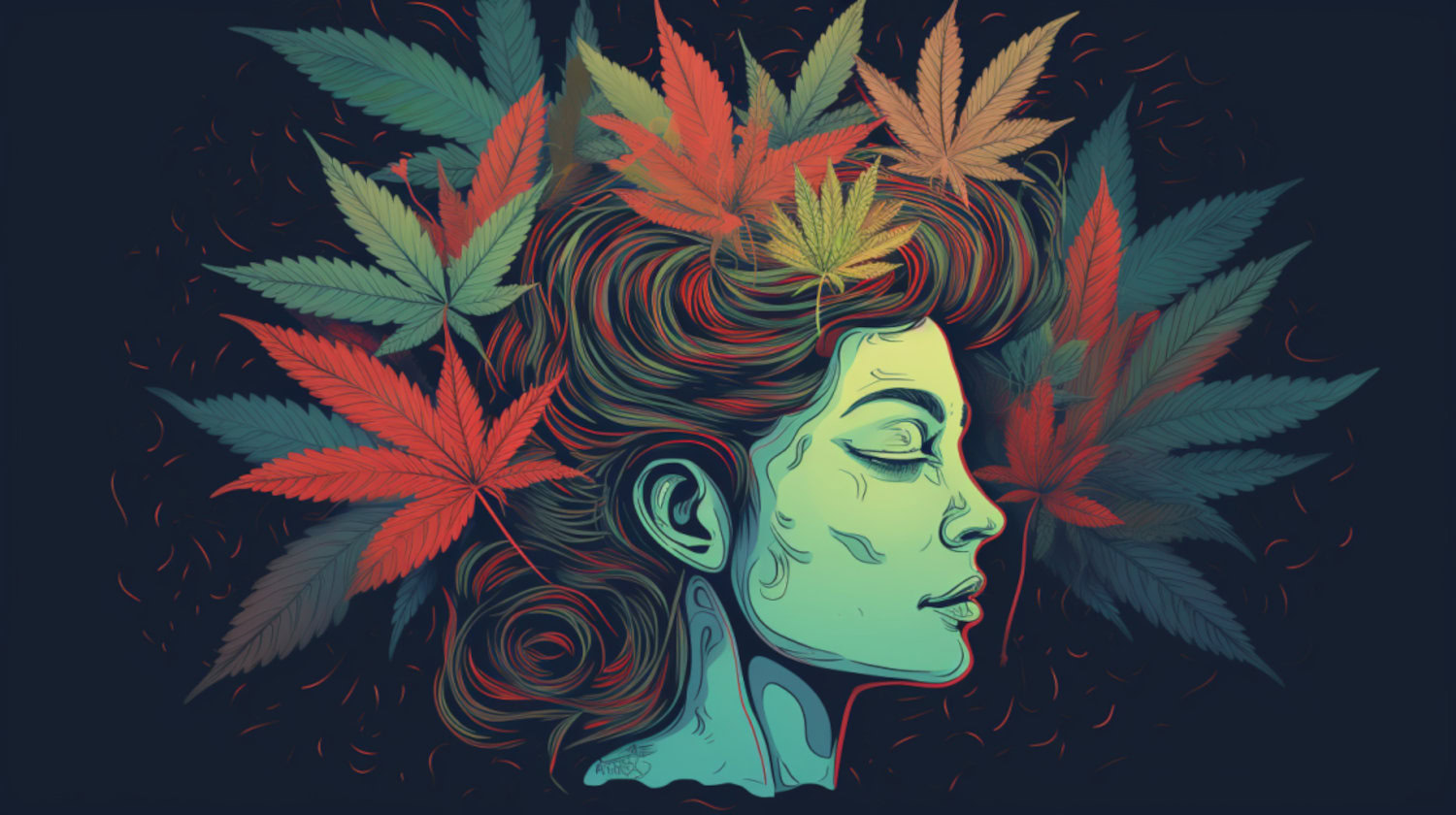In This Article
- Why Quit Cannabis?
- What About Cannabis Withdrawal?
- Does Quitting Weed Cause Depression?
- How Long Does it Take to Get Back to Normal?
- Tips for Quitting or Cutting Back
- Understand Why You're Quitting
- Don't Punish Yourself for Having Cravings
- Create an Alternative Self-Care Plan
- Quitting is a Personal Process
- The Case for Moderation
- References
Cannabis use has become a more regularly accepted plant medicine and recreational hobby within the last decade. It is generally viewed as a mild but effective remedy to various medical ailments and a mild consumption habit for social and creative activities.
Similar to most substances and medicines, cannabis can be overused, misused, or the connection to the plant changes as we do. These are a few reasons why someone may decide to quit their cannabis consumption habits.
As with stopping any substance, there are reasons a person may want to stop using cannabis. To provide further insight into life after quitting weed, we spoke to three individuals who have either quit or severely cut back their cannabis use to understand their experiences with the potential of withdrawal symptoms, the process of getting sober, and their tips for cutting back.
Why Quit Cannabis?
There are plenty of reasons why a person may choose to stop consuming cannabis; some are medically driven, while others can be more personal.
One of the most common medical reasons people quit is due to cannabis use disorder (CUD), where patients develop an excessively high tolerance, persistent cravings, and an inability to quit despite adverse consequences. When these patients finally stop using cannabis, they typically experience withdrawal effects.1
The other medical condition that causes people to quit is cannabis hyperemesis syndrome (CHS). This syndrome causes patients to have persistent, severe nausea and frequent vomiting after cannabis usage.
It’s also possible to have cannabis allergies, where typical allergic reaction symptoms such as hives, rashes, sneezing, and swelling occur after consumption.
Additional reasons people may quit are due to external factors; examples include having a federal government job or traveling to places where cannabis is illegal and, therefore, inaccessible.
Medical professionals strongly advise against cannabis use while pregnant to protect the health and wellness of both the pregnant individual and the child. One review of women found that many had questions about cannabis use regarding issues, including fertility, cannabis exposure to infants through breast milk, legal implications of usage, and second-hand smoke.2
Other consumers may take tolerance breaks and stop usage for temporary periods to lower their tolerance, reduce strain on their lungs from consumption methods like smoking, or just because they don’t feel the need to consume for a while.
Whatever the reason for quitting, it is essential to understand how the body may respond. Even with short-term daily cannabis use, there is the potential to experience adverse effects when suspending use.
What About Cannabis Withdrawal?

Since cannabis is generally considered a mild substance with many medical benefits, it’s common to believe that stopping cannabis use may not cause too many adverse side effects. However, cannabis use can be complex and unique to each person. The physical and psychological experiences during and after consumption can significantly influence an individual's habits.
In recent years, medical professionals have started to better understand what happens to the body when one stops cannabis consumption.
Cannabis withdrawal syndrome (CWS) is a relatively common condition that regular cannabis users experience when they abstain from usage. One review of studies found that 47% of over 23,000 study participants experienced withdrawal symptoms. Symptoms of withdrawal can include a range of ailments, including irritability, anxiety, sleep problems, changes in appetite or weight, depression, abdominal pain, sweating, fever, chills, and headache.3
The difficulty for some is that these symptoms can often be remedied by cannabis use, which can cause a cycle of unhealthy usage. It’s crucial to remain focused and motivated throughout abstinence, as withdrawal symptoms are temporary. Researchers have found that CWS symptoms can start to reduce after two days of abstinence but can last up to three weeks.4
Does Quitting Weed Cause Depression?

The phenomenon of depression from cannabis withdrawal is a form of situational depression. Individuals experience a temporary period of depressive symptoms which happen as a result of specific circumstances.
Why does it happen in the first place? There may be some science behind why certain consumers experience weed withdrawal symptoms.
First, there is a possibility that individuals are using cannabis to relieve symptoms of depression. Unfortunately, that may lead to a cycle of increasing cannabis use, which could exacerbate both conditions. It’s one reason moderation is key because discontinuing cannabis may also result in a resurgence of depressive symptoms.5
Cannabis use can also influence the brain's reward system, which is responsible for experiencing pleasure and motivation. Chronic cannabis use may lead to alterations in the brain's reward pathways, specifically the dopamine system. Chronic users of high-THC cannabis may experience a reduction in dopamine activity, which may lead to symptoms of depression.6
How Long Does it Take to Get Back to Normal?
Cannabis use is a personal experience. The way one person feels when smoking a cultivar or taking 5mg of THC may dramatically differ from another. Several factors can contribute to how cannabis makes a person feel, including dosage and tolerance level. These factors can affect how long the body will process and remove the cannabinoids.
Researchers have studied how long it takes for the cannabinoid receptors of the endocannabinoid system (ECS) to return to normal and found that it varies considerably. On average, it takes two- to three weeks or longer. However, symptoms of withdrawal can start to dissipate within 48 hours of abstinence.7
Tips for Quitting or Cutting Back

Quitting cannabis consumption can be a difficult task for some users, especially if they are dose-dependent or treating other ailments.
Many cannabis consumers have stories about quitting weed, even if it was for a brief tolerance break. Since medically documented research can be limited, these stories have provided insight into what the process of quitting looks like, withdrawal symptoms, remedies to ease some of the discomfort, and the benefits of abstaining from usage.
Depending on your reasons for consuming cannabis, the tips and tricks needed to help discontinue use will vary. Some medical advice is available for consumers to help them remedy some of the issues of CWS, namely sleep problems, which can include nightmares and restlessness. Doctors recommend activities and exercise, such as meditation and yoga.
Physical activity may help a wide range of side effects from quitting cannabis while also providing a healthy alternative coping mechanism for stress and anxiety. In general, cannabis is a personal choice, and quitting can be tricky if the proper support is not in place to ensure success.
Most users who have found success in quitting cite using cannabis as a method of coping while enjoying the positive effects. They note that they could commit to quitting by focusing on their goal, their reason for stopping.8
Understand Why You're Quitting
One user we spoke to, a 27-year-old real estate professional, has struggled with stopping her cannabis use since she started in her late teens years. She expressed that it can be difficult to stop since both the medical and recreational benefits she experiences can be blurred. “It's complex. It's very complex. I find that it's very hard to differentiate recreational versus medicinal when it's all kind of the same. You need it for certain things, and it functions well in parts of your life.”
While she has continuously made loose plans to quit, the moments of sobriety offered her “mental clarity,” which was the best part of not smoking weed. However, she often finds herself back in the habit of consumption, “It's hard 'cause, like, do I wanna quit? I don't know because I really love it.”
The delicate balance between wanting to quit and enjoying the benefits cannabis may offer can cause a continuous cycle of quitting and relapsing, which is familiar to many cannabis consumers.
Don't Punish Yourself for Having Cravings
Sendy Tapia, a San Jose-based editor and writer, cut back when she stopped working in the cannabis industry. She has been smoking since young adulthood, where she found a community and an abundance of free products while working at a local dispensary. After leaving that job, she had less access to products and decided to try sobriety.
With a partner who still consumed and little stashes hiding around her home, she focused on a particular part of smoking that she didn't like: the tedious task of packing a bowl.
“I try to ignore it by telling myself, you have to get up, you have to make sure like this is washed or like the bong is ready,” she said. “I [have to] grind it up, [I] have to pull out the stash. Like all those little steps to talk myself out of it. But if my partner's home and he's already smoking. It's kinda like, all right, all right.”
She does have a helpful tip for consumers looking to quit, “Treat it like a diet. If you really crave something, don't punish yourself. Give yourself a break, but also, instead of rolling backwoods, turn it down. Slowly start reducing that. I have switched to nothing but small little bowls instead of the big fat ones. It helps not consume as many bowls in one sitting. Those little changes go a long way for me.”
Create an Alternative Self-Care Plan
Adrienne Airhart, a chief technology officer in the cannabis industry, consumed weed every day before quitting. The sudden halt in the habitual behavior came after a string of bad experiences that had CHS-like symptoms and paranoia. It’s been six years since she’s experienced the intoxication levels she elevated to in the past.
The first few days of sobriety brought about symptoms of withdrawal, “It was similar to coffee withdrawal. I had trouble sleeping. That was the biggest one,” Airhart said. “[it was] probably two full weeks. Anxiety peaked like crazy starting the day after, and then it never really went down again, to be honest. 'cause I was using it to help with anxiety, but if I even smoke a little now, my anxiety goes through the roof with it.”
If you have been using cannabis to alleviate feelings of anxiety or depression without addressing the causes of those conditions, suddenly quitting could lead to spiking emotions that are hard to deal with in the short term.
The best part of Airhart’s cannabis-free lifestyle is the clear-headedness. “[It] was awesome and being able to do fast math in my head again and recalling information really quickly. My speed came back, and I started getting more motivated at work.”
Her tips to people looking to quit are from her retrospective – things she may have done differently if she could go back. Earheart’s three pieces of advice are to:
- “Create a self-care plan to accommodate the negative feelings and the positive feelings. So I know I'm gonna get insomnia. Prepare for that. Either try to get a little more sunshine, exercise at night, or consider an interim abatement of melatonin or something."
- “Remove the things from your life that are triggers. So if that's a person or a bong or pieces… I packed up a lot of my stuff and put it behind a closed door so I couldn't see it. [It’s] harder when you're living with a partner who smokes every day still. So being wary of that.”
- “I would talk myself up on the positives of the clear-headedness I'm gonna feel and the focus and the lack of the paranoia anxiety and the reminder that it's always there, and that I can always come back if I want to in various forms and in various potencies.”
Quitting is a Personal Process
From these three individuals, it is clear that what may work for one person may not be as effective for another. It can be a process of trial and error, sprinkled with temptation and the need for a brief moment of relief from external life factors.
To address the unique needs of individuals in search of helpful guidance in quitting cannabis use, there have been apps developed to help encourage and document the process. These digital programs offer an alternative to face-to-face treatment. One app utilized a method called APTT (Assess, Plan, Track, and Tips) to assist over 100 cannabis users who wanted to reduce or quit their habits. Over 40% of them used the app over 20 times while citing a reduction in their dependence and problems related to their consumption.9
The Case for Moderation
There are many daily substances that can be great in moderation but harmful in excess, such as coffee, sugar, fast food, and alcohol. Cannabis, much like these substances, should be consumed with mindfulness and in moderation. Overconsumption can counteract certain medical benefits that cannabis has been linked to in smaller dose levels. It can also lead to adverse and uncomfortable feelings of nausea, panic, and vomiting.
Cannabinoids have been studied and are known to have biphasic effects. This means that in low dosages, they may be beneficial for treating ailments like anxiety, while in high dosages, they may trigger these feelings.10 Maintaining a balanced and healthy relationship with cannabis use is the best practice to enjoy the benefits of the plant.
Research has shown that a reduction in cannabis use helped some users experience improvements in sleep and mental health issues like depression and anxiety.11 If you are interested in learning more about reducing your cannabis habits, it’s best to consult with a doctor or medical health professional.
References
- Kesner AJ, Lovinger DM. Cannabis use, abuse, and withdrawal: Cannabinergic mechanisms, clinical, and preclinical findings. Journal of Neurochemistry. 2021;157(5):1674-1696. doi:https://doi.org/10.1111/jnc.15369 ↩︎
- Young-Wolff KC, Gali K, Sarovar V, Rutledge GW, Prochaska JJ. Women’s Questions About Perinatal Cannabis Use and Health Care Providers’ Responses. Journal of Women’s Health. 2020;29(7):919-926. doi:https://doi.org/10.1089/jwh.2019.8112 ↩︎
- Bahji A, Stephenson C, Tyo R, Hawken ER, Seitz DP. Prevalence of Cannabis Withdrawal Symptoms Among People With Regular or Dependent Use of Cannabinoids. JAMA Network Open. 2020;3(4):e202370. doi:https://doi.org/10.1001/jamanetworkopen.2020.2370 ↩︎
- Bonnet U, Preuss U. The cannabis withdrawal syndrome: Current insights. Substance Abuse and Rehabilitation. 2017;Volume 8(8):9-37. doi:https://doi.org/10.2147/sar.s109576 ↩︎
- Dierker L, Selya A, Lanza ST, Li R, Rose J. Depression and marijuana use disorder symptoms among current marijuana users. Addictive Behaviors. 2018;76:161-168. doi:https://doi.org/10.1016/j.addbeh.2017.08.013 ↩︎
- Langlois CC, Potvin S, Khullar A, Smadar Valérie Tourjman. Down and High: Reflections Regarding Depression and Cannabis. Frontiers in Psychiatry. 2021;12. doi:https://doi.org/10.3389/fpsyt.2021.625158 ↩︎
- Connor JP, Stjepanović D, Budney AJ, Le Foll B, Hall WD. Clinical Management of Cannabis Withdrawal. Addiction. 2021;117(7). doi:https://doi.org/10.1111/add.15743 ↩︎
- Hodgins DC, Stea JN. Insights from individuals successfully recovered from cannabis use disorder: natural versus treatment-assisted recoveries and abstinent versus moderation outcomes. Addiction Science & Clinical Practice. 2018;13(1). doi:https://doi.org/10.1186/s13722-018-0118-0 ↩︎
- Albertella L, Gibson L, Rooke S, Norberg MM, Copeland J. A smartphone app intervention for adult cannabis users wanting to quit or reduce their use: a pilot evaluation. Journal of Cannabis Research. 2019;1(1). doi:https://doi.org/10.1186/s42238-019-0009-6 ↩︎
- Sharpe L, Sinclair J, Kramer A, de Manincor M, Sarris J. Cannabis, a cause for anxiety? A critical appraisal of the anxiogenic and anxiolytic properties. J Transl Med. 2020;18(1):374. Published 2020 Oct 2. doi:10.1186/s12967-020-02518-2 ↩︎
- Hser YI, Mooney LJ, Huang D, et al. Reductions in cannabis use are associated with improvements in anxiety, depression, and sleep quality, but not quality of life. Journal of Substance Abuse Treatment. 2017;81:53-58. doi:https://doi.org/10.1016/j.jsat.2017.07.012 ↩︎
The information in this article and any included images or charts are for educational purposes only. This information is neither a substitute for, nor does it replace, professional legal advice or medical advice, diagnosis, or treatment. If you have any concerns or questions about laws, regulations, or your health, you should always consult with an attorney, physician or other licensed professional.




